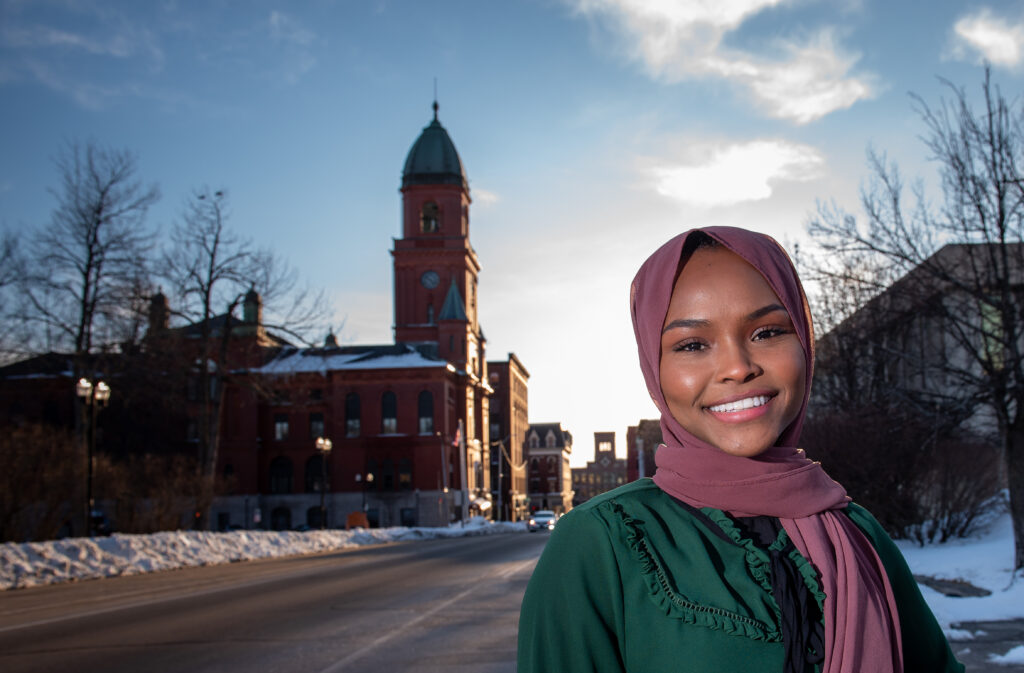
Safiya Khalid of Lewiston founded a nonprofit organization that helps people of all ages and backgrounds find ways to make a difference in their communities. She found mentorship to realize her dream through a MaineCF grant program tailored for leaders of color. Russ Dillingham photo
Safiya Khalid is a natural leader.
Khalid was just 23 in 2019 when she became the first Somali American elected to the Lewiston City Council. After one term, Khalid knew she wanted to lead change through launching her own nonprofit organization that would inspire people to take action in their communities.
But first , she needed guidance on how to start an organization from the grassroots up.
Khalid, a graduate student with a full-time job, found mentorship through Maine Community Foundation's Investing in Leaders of Color (ILOC) program. ILOC offers professional development opportunities for nonprofit leaders whose critical work builds racial equity in our communities.
Today Community Organization Alliance (COA) , the nonprofit Khalid founded in 2022, mirrors the platform from her city council election . It aims to diversify representation in government, increase access to education and health care, and boost civic engagement among people of color.
COA provides bi-monthly, three-day workshops to people of all ages and backgrounds that aim to center marginalized voices, encourage advocacy, and strategize ways participants can make a difference in their communities.
The seeds for ILOC were planted in 2016 when MaineCF identified racial equity as one of its strategic priorities.
"Most equity work is done by leaders of color who work in under-resourced organizations and lack time and opportunities for professional development," said Gloria Aponte C., MaineCF senior program officer.
MaineCF staff spent two years conducting nearly 80 field interviews with nonprofit and community leaders across the state to determine how best to support them. The learnings were clear: Maine's leaders of color needed tailored professional development opportunities that would benefit both individuals and their organizations.
ILOC's key element is one-on-one professional coaching. Nonprofit leaders selected for the program have access to 28 professional coaches and can select a coach whose expertise best suits their needs - whether it 's polishing public speaking, drafting an employee handbook, or any number of leadership and organizational skills.
The ILOC program has served 38 participants since its launch in 2020. It provides a $6,950 capacity-building grant that includes individualized coaching for Black, Indigenous, and other leaders of color to grow professionally, strengthen their organizations, and build networks. Funds can also be used to purchase technology and soft ware, materials for continued learning, and memberships to professional organizations. MaineCF donors have provided funding for ILOC.
Participants say the program provided access to training they might not have had, and they've honed leadership skills that benefit their organizations.
"ILOC was a huge centerpiece in the success of COA," Khalid said. "I was able to turn to my coach, who helped me with the board structure, identifying grant opportunities, and applying for grants."4
Aponte C., of MaineCF, did not anticipate the strength of relationships forged through ILOC.
"There are deep bonds formed and profound levels of support from coaches and leaders," she said. "I've heard from ILOC participants that they maintain contact with their coach long after the program has ended."
Khalid says it is vital to uplift people of color in leadership positions to reflect the diverse makeup of Maine's communities.
"It's crucial because leaders of color are from communities that have been historically underserved and underrepresented, so when they take that step to become a leader -- whether it's starting an organization or running for political office -- they are representing others in their community," Khalid said. "Investing in them and supporting them through programs such as ILOC is crucial for their success because they may not have the privilege of tons of other options.
"It's important to take a risk and bet on them so it breaks down generational barriers to build equity and justice."





